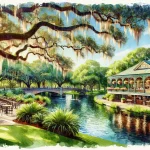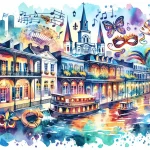New Orleans, a city celebrated for its distinctive culture and storied past, owes much of its singular character to the substantial impact of Hispanic heritage. From the city’s formative years under Spanish rule to the present-day contributions of the Hispanic community, this interwoven cultural fabric has molded New Orleans in myriad ways. With 5.3% of the city’s population identifying as Hispanic or Latino, according to the U.S. Census Bureau, the influence of this diverse community resonates throughout the city.
In This Article
TL;DR
- The Hispanic community has profoundly shaped New Orleans‘ history, culture, and development over the years.
- Key historical figures, landmarks, and cultural events highlight the city’s rich Hispanic heritage.
- Today, Hispanic cuisine, art, music, and traditions continue to thrive and enrich the vibrant tapestry of New Orleans.
The Roots of Hispanic Influence in New Orleans
New Orleans’ connection to Hispanic culture dates back to the city’s early history. In 1762, France ceded Louisiana to Spain, and for the next four decades, New Orleans was governed by the Spanish Crown. During this period, Spanish architecture, cuisine, and traditions began to intertwine with the existing French and African influences, creating a unique cultural amalgamation.
The city’s strategic location near the mouth of the Mississippi River facilitated trade and migration between New Orleans and various Latin American countries. This exchange of goods and people further strengthened the Hispanic influence on the city’s development.
Historical Landmarks
New Orleans is home to several historical landmarks that showcase its Hispanic heritage. One notable example is the Cabildo, a former Spanish government building situated in the French Quarter. It was here that the Louisiana Purchase was signed in 1803, transferring ownership of the territory from France to the United States.
Another significant site is the Spanish Plaza, located on the riverfront. This picturesque plaza features a fountain, benches, and tiled murals depicting scenes from Spanish history and culture.
Prominent Hispanic Figures in New Orleans History
Throughout New Orleans’ history, numerous Hispanic figures have left an indelible mark on the city’s cultural, political, and economic landscape. One such individual is Francisco Bouligny, a Spanish military leader who served as the governor of Louisiana in the late 18th century. Bouligny played a crucial role in the city’s development, overseeing the construction of important infrastructure and founding many local families.
Contributions to Arts and Culture
Hispanic artists, musicians, and entrepreneurs have significantly contributed to New Orleans’ dynamic cultural scene. From the lively rhythms of salsa and merengue to the colorful murals adorning the city’s walls, Hispanic influence is interwoven into the fabric of New Orleans’ artistic expression.
Current Hispanic Cultural Events and Locations
New Orleans celebrates its Hispanic heritage through various cultural events and locations. The annual Hispanic Heritage Festival, held in October, showcases the diversity of Hispanic culture through music, dance, art, and cuisine. Visitors can enjoy live performances, traditional crafts, and delectable Latin American dishes.
The Hispanic Resource Center, located in the Mid-City neighborhood, serves as a hub for the Hispanic community, offering educational programs, cultural events, and support services.
Cultural Centers and Museums
Several centers and museums in New Orleans focus on Hispanic culture, providing educational programs and cultural exhibitions. The New Orleans Museum of Art (NOMA) frequently features exhibitions highlighting Hispanic artists and their contributions to the art world.
Hispanic Cuisine in New Orleans
Hispanic cuisine has greatly influenced New Orleans’ famous culinary landscape. From the spicy flavors of Mexican dishes to the savory delights of Cuban and Puerto Rican fare, Hispanic restaurants and food trucks have become an integral part of the city’s dining scene.
Iconic Hispanic Restaurants
Some well-known Hispanic restaurants in New Orleans include:
1. Taqueria Corona (5932 Magazine St, New Orleans, LA 70115): This popular Mexican restaurant is known for its authentic tacos, burritos, and quesadillas. Open daily from 11 am to 10 pm.
2. Norma’s Sweets Bakery (2925 Bienville St, New Orleans, LA 70119): This beloved Cuban bakery offers a wide selection of traditional pastries, sandwiches, and coffee. Open Monday through Saturday from 7 am to 5 pm.
3. La Macarena Pupuseria & Latin Cafe (8120 Hampson St, New Orleans, LA 70118): This Salvadoran restaurant is famous for its pupusas, a traditional stuffed corn tortilla. Open Tuesday through Sunday from 11 am to 9 pm.
Hispanic Traditions and Their Integration into New Orleans Culture
New Orleans has embraced and integrated various Hispanic traditions into its cultural calendar. One notable example is the celebration of Día de los Muertos (Day of the Dead), a Mexican holiday honoring deceased loved ones. Each year, local organizations host events featuring altars, processions, and cultural performances.
Cinco de Mayo, which commemorates the Mexican Army’s victory over the French Empire at the Battle of Puebla in 1862, is another popular celebration in New Orleans. Many restaurants and bars offer special promotions and events to mark the occasion.
Annual Celebrations and Parades
In addition to the Hispanic Heritage Festival, New Orleans hosts several other annual events that highlight Hispanic culture:
1. Carnaval Latino (Kenner, LA): This vibrant celebration features live music, dancing, and authentic Latin American cuisine. Held annually in October.
2. Que Pasa Fest (New Orleans City Park): This free festival showcases the diversity of Hispanic culture through music, art, and food. Typically held in October.
Educational Impact and Community Outreach
Education plays a crucial role in preserving and promoting Hispanic heritage in New Orleans. Many local schools and organizations offer language courses, cultural classes, and community outreach programs to foster understanding and appreciation of Hispanic culture.
Schools and Educational Programs
Several schools and institutions in New Orleans offer programs focused on Hispanic studies and languages:
1. Tulane University (6823 St. Charles Ave, New Orleans, LA 70118): Tulane’s Department of Spanish and Portuguese offers undergraduate and graduate programs in Hispanic language, literature, and culture.
2. Loyola University New Orleans (6363 St. Charles Ave, New Orleans, LA 70118): Loyola’s Department of Languages and Cultures provides courses in Spanish language and Hispanic cultural studies.
Economic Influence of the Hispanic Community in New Orleans
The Hispanic community has a significant economic impact on New Orleans, with numerous Hispanic-owned businesses contributing to the local economy. From restaurants and shops to professional services and construction companies, these enterprises play a vital role in the city’s economic landscape.
Hispanic Business Districts and Markets
Several areas in New Orleans are known for their concentration of Hispanic businesses:
1. Kenner: This suburb of New Orleans has a thriving Hispanic community, with numerous Latin American restaurants, markets, and shops along Williams Boulevard.
2. Mid-City: The area around Tulane Avenue and Carrollton Avenue is home to several Hispanic-owned businesses, including grocery stores, bakeries, and service providers.
Preservation and Promotion of Hispanic Heritage
Local government and cultural organizations in New Orleans are actively engaged in efforts to preserve and promote Hispanic heritage. These initiatives include supporting cultural events, funding educational programs, and collaborating with Hispanic community leaders to ensure that this rich cultural legacy continues to thrive.
Role of Cultural Organizations
Several organizations in New Orleans are dedicated to the preservation and promotion of Hispanic culture:
1. Puentes New Orleans: This non-profit organization works to support and empower the Hispanic community through educational programs, advocacy, and cultural events.
2. Hispanic Chamber of Commerce of Louisiana: The chamber promotes economic development and business opportunities for the Hispanic community in New Orleans and throughout the state.
By exploring the historical roots, cultural contributions, and ongoing influence of the Hispanic community, visitors to New Orleans can gain a deeper appreciation for the city’s rich and diverse heritage. From savoring authentic Latin American cuisine to attending vibrant cultural festivals, there are countless ways to experience and celebrate Hispanic heritage in the Crescent City.
The Higgins Hotel Curio, located at 1000 Magazine Street, New Orleans, LA 70130, offers a luxurious and historically significant stay in the heart of the city. As a guest at this prestigious hotel, you’ll be well-positioned to explore the many facets of Hispanic heritage that have shaped New Orleans into the unique and captivating destination it is today.






